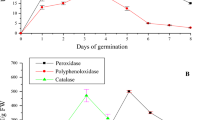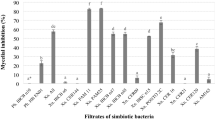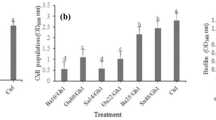Abstract
SEEDS of Glycine max Merr. (soybean) contain several biologically active materials, including saponins and trypsin inhibitors1. However, in a recent review of the antimicrobial activity of vascular plants2, no mention is made of the occurrence of antimicrobial compounds in soybeans. We are reporting the presence of a factor (s) that inhibits the mould growth of Rhizopus sp. (provisionally identified as R. oligosporus Saito), which is utilized in the fermentation of soybeans to make the Indonesian food tempeh3.
This is a preview of subscription content, access via your institution
Access options
Subscribe to this journal
Receive 51 print issues and online access
$199.00 per year
only $3.90 per issue
Buy this article
- Purchase on Springer Link
- Instant access to full article PDF
Prices may be subject to local taxes which are calculated during checkout
Similar content being viewed by others
References
Rackis, J. J., Sasame, H. A., Mann, R. K., Anderson, R. L., and Smith, A. K., Arch. Biochem., 93, 471 (1962).
Nickell, L. G., Econ. Bot., 13, 281 (1959).
Hesseltine, C. W., Proc. Conf. Soybean Products for Protein in Human Foods Peoria, Illinois, September 13–15, 1961. ARS-71-22, 67.
Djien, K. S., and Hesseltine, C. W., Soybean Dig., 22, 14 (1961).
Author information
Authors and Affiliations
Rights and permissions
About this article
Cite this article
HESSELTINE, C., DE CAMARGO, R. & RACKIS, J. A Mould Inhibitor in Soybeans. Nature 200, 1226–1227 (1963). https://doi.org/10.1038/2001226b0
Issue Date:
DOI: https://doi.org/10.1038/2001226b0
This article is cited by
Comments
By submitting a comment you agree to abide by our Terms and Community Guidelines. If you find something abusive or that does not comply with our terms or guidelines please flag it as inappropriate.



